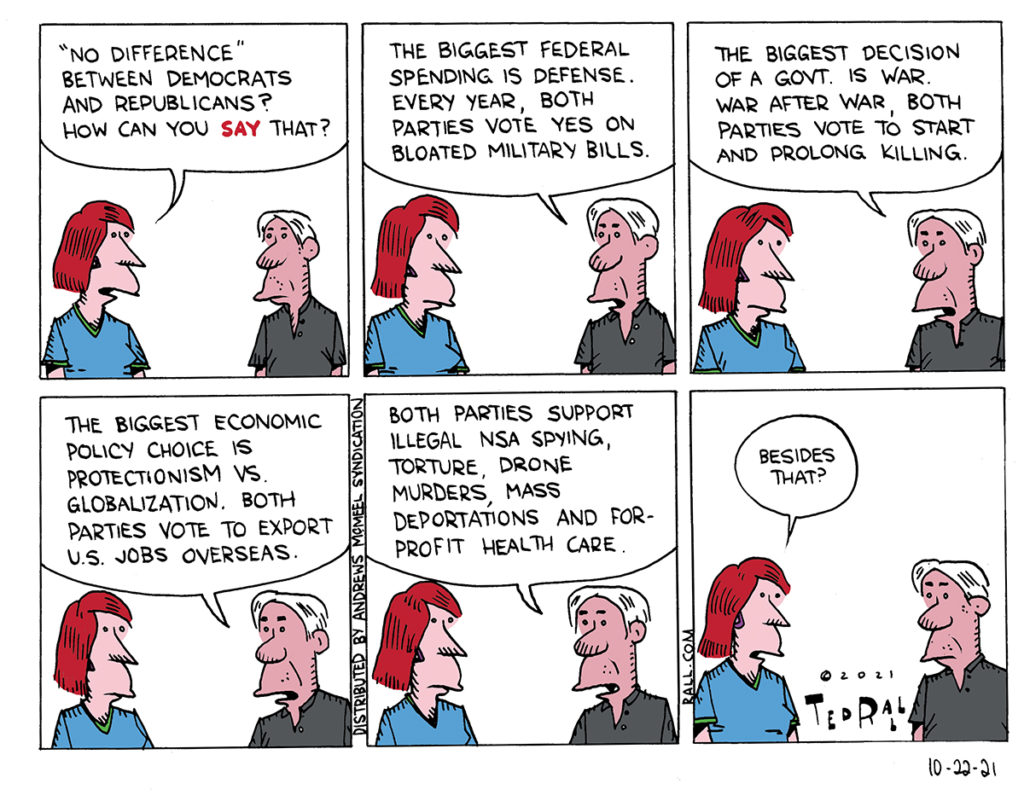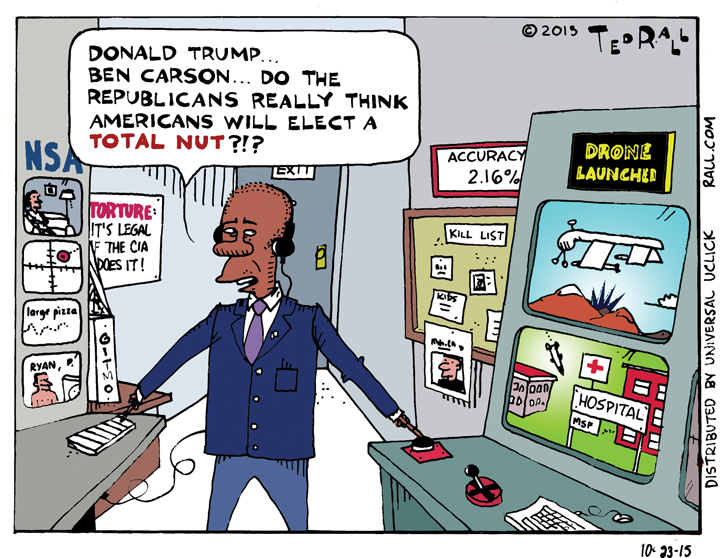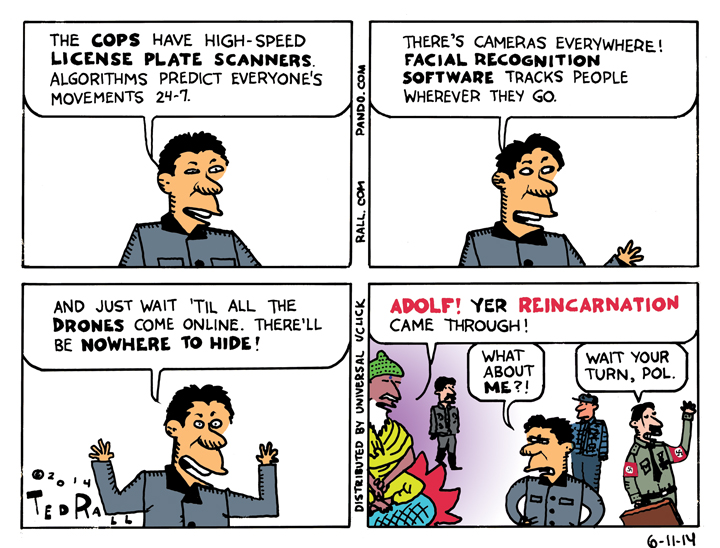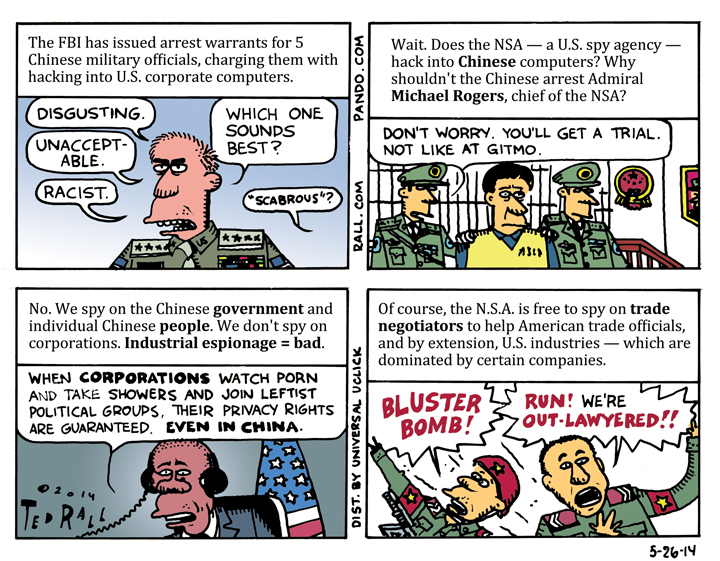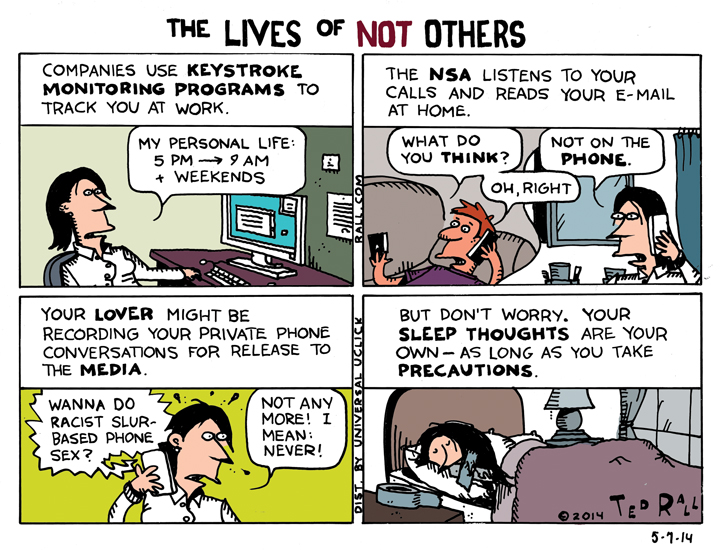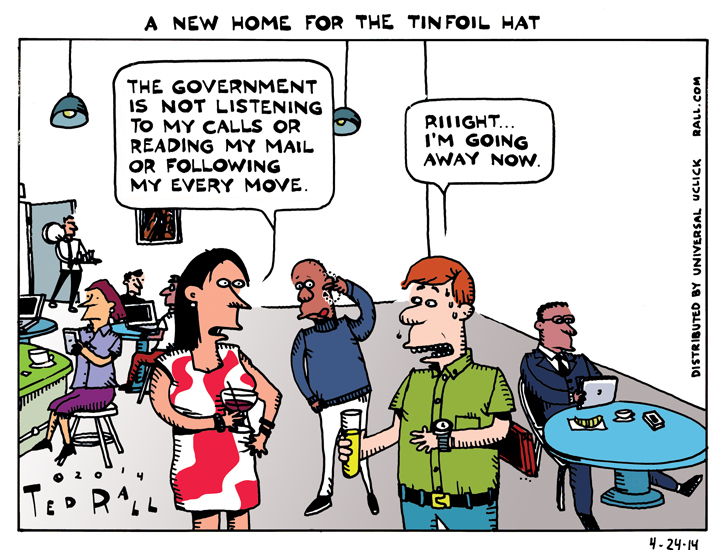Democrats often ask progressives: how can you say that there’s no difference between Democrats and the Republican party? While there are differences of tone, on the most important issues there is little to no difference in policy. And Congressional votes reflect that.
SYNDICATED COLUMN: How Bernie Can Pay For His Ambitious Agenda? Slash the Military
Late last year, I interviewed Bernie Sanders while working on my biography “Bernie.” I asked him if he planned to reduce the defense budget if elected president. “We will take a hard look at that,” he told me, agreeing that there’s an awful lot of bloat in America’s military spending that ought to be cut.
Why doesn’t he say that now?
A statement detailing his intent to reduce military spending — not just the on-the-books budget of the Pentagon, but also the “off the books” taxdollars that go to wars like the occupations of Afghanistan and Iraq, as well as the National Security Agency and other parts of the surveillance state that have expanded radically since 9/11 — would help answer one of Sanders’ critics’ most potent criticisms: that he’ll be an irresponsible Santa Gone Wild, giving away free college tuition and Medicare for all without a care in the world for how to pay for it.
Hillary Clinton’s campaign, already reeking of desperation, is turning ugly. Bill Clinton, of all people, accused Bernie of lying, and his supporters of sexism. Clinton surrogate Madeleine Albright called female Sanders supporters traitors to their gender. The once-respected Gloria Steinem called them sluts, implying they were hanging out at Bernie’s big rallies to get laid by hunky Bernie bros.
Pathetic. But Hillary remains a potent force. She’s the mathematical favorite. When she casts herself as the realist (“a progressive who likes to get things done”), her argument that Bernie’s promises are politically unrealistic and fiscally irresponsible carries weight with Democrats who are still on the fence.
If Bernie can answer this two-part question, he wins the nomination: how will he get his far-left programs (by American standards, not those of the rest of the world) through Congress? How will he pay for them?
The first question, I think, isn’t as big a hurdle as the corporate punditry seems to think. Most voters can imagine a sustained progressive movement centered around street activism — Sanders’ “political revolution” — that pressures Congress so that, as Sanders puts it, Mitch O’Connell sees hundreds of thousands of people marching outside his window whenever he plots to thwart the people’s will.
Like Occupy Wall Street, except that the president is encouraging the movement rather than ordering the cops to beat up its members.
Anyway, liberal Democrats are angry. Hillary’s “half a dream” sales pitch isn’t half as enticing to them as Bernie’s ambitious agenda. Come on, Hill: did you take half a bribe from Goldman Sachs? Even if Bernie’s idealism gets dashed on the rocks of Republican intransigence, progressive Dems don’t care; they want to see Bernie try. Democrats haven’t watched a Democratic president push for radical change since LBJ.
The second question of the skeptics is: show me the money! Where is the cash to pay for free public college tuition and a single-payer healthcare system?
Sanders has said he would cover the $75 billion per year cost of his college reform program by imposing a tax on Wall Street speculation. He would almost certainly increase taxes on corporations and wealthy individuals as part of moving the tax code back to a more progressive, pre-Reagan structure. Everyone would pay a higher tax rate to cover Berniecare, though working-class people would pay less than they’d save.
At the risk of sounding like a Republican, there’s waste throughout the federal budget. There is, for example, no evidence that the NSA has ever done its job by preventing a single terrorist attack. Meanwhile, as Edward Snowden informed us, they’re spying on all our phone calls and emails. Shut them down; save $10 billion a year or more. Similarly, the Department of Homeland Security could be trimmed to a fraction of its current size or eliminated, with its tiny portion of useful activities transferred to other agencies, including law enforcement.
Last year’s defense budget was nearly $600 billion, or 54% of discretionary federal spending. That’s more than the next nine countries combined, including China and Russia. Conservatively, at least half of that is spent on waste and fraud by DOD contractors, so there’s $300 billion right off the bat. I bet we could cut it 90% and still not have to worry about a foreign invasion, something that hasn’t happened since 1812.
These cuts could easily cover the several hundred billion shortfall between Bernie’s tax increase on the rich and the cost of his healthcare plan.
Nothing says fiscal conservatism like pacifism. As of 2015 the wars against Afghanistan and Iraq, the most expensive in U.S. history, cost more than $1.5 trillion. More than $1 billion a year is still going down those ratholes. Bernie has said ISIS must be “crushed,” but he may want to revisit that. As of November, the anti-ISIS air and jihadi-training campaign had cost $5 billion and counting.
And obviously don’t start any new wars of choice.
Studies have shown that high student loan debt hobbles economic activity, delaying the age at which college graduates can afford to buy their first cars and homes. Freeing college graduates and their parents from exorbitant tuition bills would stimulate the automobile and real estate markets in particular, as well as the overall economy.
The same is true for healthcare costs. Every dollar you don’t spend on health insurance premiums, deductibles and co-pays is one you have for something else. That’s a lot of potential stimulus.
I don’t know why the Sanders campaign hasn’t issued a detailed plan explaining how President Sanders would cover the costs of free college tuition and Medicare for All. Maybe they’re worried about getting attacked as weak on national security by the hawkish Secretary Clinton and, in the general election, by the Republican nominee (probably Trump or Cruz).
Though a valid concern, it should take a back seat to plugging the Bernie-is-just-a-dreamer narrative Hillary’s camp is framing him with. He’ll never be able to out-militarist Hillary or the Republicans, who will try to brand him as the second coming of Vladimir Lenin anyway. Why bother to try?
(Ted Rall is the author of “Bernie,” a biography written with the cooperation of Democratic presidential candidate Bernie Sanders. “Bernie” is now on sale online and at all good bookstores.)
SYNDICATED COLUMN: Empty Symbolism – Why the Freedom Act Sucks

Marketed as pro-privacy reform of the rancid Patriot Act, the USA Freedom Act is about to become law. Though nothing could be further from the truth, many Americans will believe that the NSA is being reined in, and move on another issue.
The Freedom Act has been characterized as another vindication of Edward Snowden — and, considering the fact that we wouldn’t be discussing the balance between individual privacy rights and national security if he hadn’t made the NSA’s spying against us public, it is.
We’re also being told that the Freedom Act will protect us from the NSA.
It won’t.
“This is more than symbolic,” said Georgia Tech professor Peter Swire, who worked on an Obama task force that studied NSA surveillance in the wake of the Snowden revelations.
No. It isn’t.
Symbolic is exactly what the Freedom Act is.
As The New York Times reports, most of the fascism-lite Patriot Act will remain in force under the Freedom Act: “only three provisions that temporarily expired Monday are now at issue, two of which have apparently been used only rarely.” The Freedom Act mainly affects the collection of “telephony metadata”: times of phone calls, the numbers of you called and were called from, how long you were on the phone, where you were, etc.
Telephony metadata is the tip of the iceberg.
Programs like Gumfish, through which NSA agents turn on Americans’ computer cameras to spy on them at their homes — and take photos of them nude and/or while having sex— are unaffected. So will programs like Mystic, which records and stores the voice recordings of your calls for at least five years. As I write in my upcoming biography of Snowden, so do many, many of the NSA’s Orwellian assaults on decency and personal freedoms.
Within the narrow sphere of telephony metadata, the Freedom Act creates one major reform: “it would take the government out of the business of bulk collection of telephone and Internet data like the numbers, times and duration of phone calls, leaving that information in the hands of telecommunications companies instead. But the government would still have the power to systematically gain access to the data in order to analyze indirect links between callers, just as it had under the old program.”
How exactly will the NSA “systematically gain access” to metadata under the Freedom Act? It will file a request with the FISA (Foreign Intelligence Surveillance Act) court.
Which will always say yes.
The FISA Court, which never hears from privacy advocates or a lawyer for the victim being targeted, is a rubber stamp for the government. It approves every request for spying on Americans: 1856 out of 1856 in 2012, for example. In 2011, 1674 out of 1674. In 2010, 1506 out of 1506.
You get the picture.
The NSA will still get your metadata. They’ll just have to file some paperwork to get it.
The Freedom Act sucks.
What should Congress have done instead?
If an individual were breaking as many laws as the NSA, he’d face life in prison, or execution. If a corporation — one that wasn’t politically connected — were breaking as many laws, its directors would be prosecuted and it would be shut down. The bar for government conduct should be at least as high as for you and me.
As we’ve learned from Snowden, the NSA is a rogue agency.
Here’s what would fix the problem: the NSA should be shut down. Its top officials, and those of its affiliated private contracting firms, should be imprisoned. So should every public official who approved their disgusting espionage against us.
What about the terrorists? Don’t worry; we’ll still be safe. There is no evidence — zero — that the NSA has disrupted a single plot against the United States since 9/11.
Even by the incremental standards of contemporary reform, the Freedom Act is some ridiculously weak tea.
Meaningful reform would have taken the NSA out of the spying-on-Americans business entirely. After all, that’s what their charter requires. They’re only supposed to spy on foreign “signals intelligence.” Overseas. Not here.
Significant reform would have shut down all of the programs revealed by Snowden, including Mystic and Gumfish and the like.
The Freedom Act leaves us with empty symbolism.
At bare minimum, the NSA should have to apply for a search warrant from a real federal court — as opposed to the joke that is the FISA court — when it wants the phone company to turn over your telephony metadata.
“In legislation no bread is often better than half a loaf,” the progressive Robert La Follette observed a century ago. “Half a loaf, as a rule, dulls the appetite, and destroys the keenness of interest in attaining the full loaf.” With the Freedom Act, Americans are being asked to settle for a crumb.
(Ted Rall, syndicated writer and the cartoonist for The Los Angeles Times, is the author of the new critically-acclaimed book “After We Kill You, We Will Welcome You Back As Honored Guests: Unembedded in Afghanistan.” Subscribe to Ted Rall at Beacon.)
COPYRIGHT 2015 TED RALL, DISTRIBUTED BY CREATORS.COM
SYNDICATED COLUMN: The NSA Loses in Court, but the Police State Rolls On

Edward Snowden has been vindicated.
This week marks the first time that a court – a real court, not a sick joke of a kangaroo tribunal like the FISA court, which approves every government request and never hears from opponents – has ruled on the legality of one of the NSA’s spying programs against the American people.
Verdict: privacy 1, police state 0.
Yet the police state goes on. Which is what happens in, you know, a police state. The pigs always win.
A unanimous three-judge ruling by the US Court of Appeals for the Second Circuit, in New York, states unequivocally that the Obama Administration’s interpretation of the USA Patriot Act is fatally flawed. Specifically, it says, Congress never intended for Section 215 to authorize the bulk interception and storage of telephony metadata of domestic phone calls: the calling number, the number called, the length of the call, the locations of both parties, and so on. In fact, the court noted, Congress never knew what the NSA was up to before Snowden spilled the beans.
On the surface, this is good news.
It will soon have been two years since Snowden leaked the NSA’s documents detailing numerous government efforts to sweep up every bit and byte of electronic communications that they possibly can — turning the United States into the Orwellian nightmare of 1984, where nothing is secret and everything can and will be used against you. Many Americans are already afraid to tell pollsters their opinions for fear of NSA eavesdropping.
One can only imagine how chilling the election of a neo-fascist right-winger (I’m talking to you, Ted Cruz and Scott Walker) as president would be. Not that I’m ready for Hillary “privacy for me, not for thee” Clinton to know all my secrets.
Until now, most action on the reform front has taken place abroad, especially in Europe, where concern about privacy online has led individuals as well as businesses to snub American Internet and technology companies, costing Silicon Valley billions of dollars, and accelerated construction of a European alternative to the American dominated “cloud.”
Here in the United States, the NSA continued with business as usual. As far as we know, the vast majority of the programs revealed by Snowden are still operational; there are no doubt many frightening new ones launched since 2013. Members of Congress were preparing to renew the disgusting Patriot Act this summer. One bright spot was the so-called USA Freedom Act, which purports to roll back bulk metadata collection, but privacy advocates say the legislation had been so watered down, and so tolerant of the NSA’s most excessive abuses, that it was just barely more than symbolic.
Like the Freedom Act, this ruling is largely symbolic.
The problem is, it’s not the last word. The federal government will certainly appeal to the U.S. Supreme Court, which could take years before hearing the case. Even in the short run, the court didn’t slap the NSA with an injunction to halt its illegal collection of Americans’ metadata.
What’s particularly distressing is the fact that the court’s complaint is about the interpretation of the Patriot Act rather than its constitutionality. The Obama Administration’s interpretation of Section 215 “cannot bear the weight the government asks us to assign to it, and that it does not authorize the telephone metadata program,” said the court ruling. However: “We do so comfortably in the full understanding that if Congress chooses to authorize such a far-reaching and unprecedented program, it has every opportunity to do so, and to do so unambiguously.”
Well, ain’t that peachy.
As a rule, courts are reluctant to annul laws passed by the legislative branch of government on the grounds of unconstitutionality. In the case of NSA spying on us, however, the harm to American democracy and society is so extravagant, and the failure of the system of checks and balances to rein in the abuses so spectacular, that the patriotic and legal duty of every judge is to do whatever he can or she can to put an end to this bastard once and for all.
It’s a sad testimony to the cowardice, willful blindness and lack of urgency of the political classes that the New York court kicked the can down the road, rather than declare the NSA’s metadata collection program a clear violation of the Fourth Amendment’s right to be free from unreasonable search and seizure.
(Ted Rall, syndicated writer and the cartoonist for The Los Angeles Times, is the author of the new critically-acclaimed book “After We Kill You, We Will Welcome You Back As Honored Guests: Unembedded in Afghanistan.” Subscribe to Ted Rall at Beacon.)
COPYRIGHT 2015 TED RALL, DISTRIBUTED BY CREATORS.COM
Snowden
Publication Date: August 25, 2015
Order at Amazon!
As many as 1.4 million citizens with security clearance saw some or all of the same documents revealed by NSA contractor Edward Snowden. Why did he, and no one else, decide to step forward and take on the risks associated with becoming a whistleblower and then a fugitive? Rall’s all-comic, full-color biography delves into Snowden’s early life and work experience, his personality, and the larger issues of privacy, surveys the new surveillance technologies being deployed against the American people, and the recent history of government intrusion. Rall describes Snowden’s political vision and hopes for the future. The book tells two stories: Snowden’s and a larger one that describes all of us on the threshold of tremendous technological upheaval and political change.
Snowden is a portrait of a brave young man standing up to the most powerful government in the world and, if not winning, at least reaching a stand-off, and in this way is an incitation to us all to measure our courage and listen to our consciences in asking ourselves what we might have done in his shoes.
Current Events/Biography, 2015
Seven Stories Press Paperback, 5″x7″, 224 pp., $16.95
To Order A Personally Signed Copy directly from Ted:
Bluster Bomb
The United States government claims that there’s a distinction between the NSA’s wholesale collection of information by and about individuals and governments overseas, versus the Chinese army unit charged with industrial espionage against American companies. The rest of the world, however, isn’t buying it.

